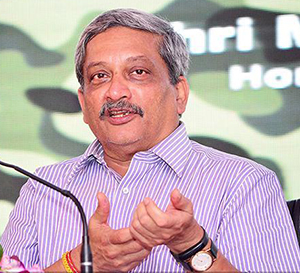Ahmedabad, Oct 17: Defence Minister Manohar Parrikar today appeared to give credit to "RSS teaching" for the decision to launch cross-LoC surgical strikes even as he slammed those seeking proof for the Indian Army's anti-terror operation in the Pakistan-occupied Kashmir.
"I wonder, with the combination of Prime Minister who comes from Mahatma Gandhi's home state, and I, Defence Minister, coming from Goa which never had any martial race, and surgical strikes. May be the RSS teaching was at the core, but this was quite a different kind of combination," Parrikar said in remarks that may trigger a row.
Parrikar was speaking at a function, 'Know my Army', organised at Nirma University here.
He said the action of Indian Army, whom he described as the world's best, has increased the sensitivity among citizens regarding national security in a very effective way.
The Defence Minister said the Army is giving befitting reply to ceasefire violations by Pakistan.
"From the day of the strike till today, some politicians are seeking proof," Parrikar said without taking any names.
"When Indian Army says something we should believe it. It (Army) is world's best, professional, brave and having a very high integrity. I do not feel that anybody will seek proof from them (Army) here in Ahmedabad."
"There are people who will never get convinced even if definite proof is given," Parrikar said.
Parrikar was referring to some sections which have been asking for proof about the surgical strikes. The Army has said the strikes against terror launch pads across the LoC was carried out during the intervening night of September 28-29.
"Violations are regularly taking place for the last five-six years, you can take out figures. But the only thing that has changed now is that we are giving befitting reply," he said on ceasefire violations.
"Two good things have happened after the surgical strikes. First thing is except some politicians, every Indian is rising in unison and standing behind our brave soldiers. And the second thing is we (Indians) have acquired sensitivity regarding national security in a very effective way," he further said, adding that he is receiving mails suggesting suspicious activities.
"If people see anything wrong, they intimate the police or send me mails. Half of mails I get suggest suspicious activities happening. Many ex-servicemen are also offering their service for the nation, saying that they are retired but can still fight."
To a question on security lapses, Parrikar said, "When you are doing things and if there are lapses in it, then mistakes should be rectified."
On the illegal sneaking-in of people in Gujarat from border adjoining Pakistan, Parrikar said, "BSF is tightening security at the border. You also know that this is a difficult area where we cannot put up fences as it is a marshy area.
"But we will use technology and fill the gaps to ensure no unauthorised person enters our territory."




Comments
Boasting and praising each other.....losers always do this....
Our Army gaya bhaad me.....RSS takes all the credit
When they fail to give the basic needs for the people of the country surely they tend to divert the people in such deceptive ways taught by their leaders..
Only the Bhakts who follow without thinking are enjoying their statements & spreading the false enjoyment in social media.. In reality they too are paying their money for high price in the market on every product and bhakts are still waiting for the 15lakhs in their account which is promised(fake promise) by the cheddis in secret....
No strange, all peace loving INDIAN citizens expected this dirty comments fromm one or another corner from rss ex chaddi group.Finally came out from defense minister i/o of mawna vruth modddi.
Jai Hind.
No credit for Prime minister who came from Mahatma Gandhi's home state, credit goes to RSS those who killed Gandhi. wah re wah Parriker we never see such a stupid minister If you are in a position of Defense Minister very bad will happen to India very soon, don't forget Pakistan also a Atomic country. no need big halla gulla RSS chaddies holding Lathi in hand taking decision and what you are doing as defense minister blow job...?
Baqwas hai Baqwas
Its not RSS to be credited ....i agree that they train to fight ....but not for the sake of INDIA ....even in freedom struggle or betrayer Savarkar.....they always wanted to fight for Brahminism sake
Add new comment